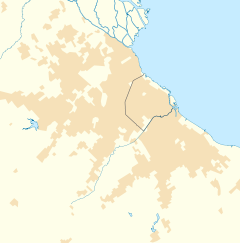Wilde, Buenos Aires
| Wilde | |
|---|---|
 |
|
| Location in Greater Buenos Aires | |
| Coordinates: 34°42′S 58°19′W / 34.700°S 58.317°WCoordinates: 34°42′S 58°19′W / 34.700°S 58.317°W | |
| Country |
|
| Province |
|
| Partido | Avellaneda |
| Population (2001 census [INDEC]) | |
| • Total | 65,881 |
| CPA Base | B 1875 |
| Area code(s) | +54 11 |
Wilde is a district located in Avellaneda Partido, Buenos Aires Province, Argentina. Wilde is the most populous district in Avellaneda, with a total of 65,881 inhabitants (as of a 2001 census). It is a part of the Greater Buenos Aires urban agglomeration.
The district originated as an estancia founded by Luis Gaitán circa 1600. The settlement was the site of the first salthouse in what is now Argentina. In 1888, Eduardo Wilde named it after his uncle, Dr. José Antonio Wilde (1813–1887). Dr. Wilde was a physician who led local efforts to improve public health, including obtaining permits for the construction of the local hospital and sewer system. The 1885 opening of a Buenos Aires Great Southern Railway station at the site led to the establishment of Villa Jurado, the city's first subdivision (1889).
Following a movement of English gardens, the city was developed by local architects as the residential borough of Avellaneda. Large grounds previously utilized by the local "gauchos" for the training of horses and farming land were eventually converted into large parks, and the region became a popular area for weekend cottages. Wilde rapidly developed into a small city, while keeping countryside aesthetics with its residential borough. On the east end of Wilde, there is a large coastal area with a sandy beach linked to the Río de la Plata, from where it is possible to see (on clear days) the coast of Uruguay.
During the 1930s through 1950s, many European immigrants settled in and around Wilde, creating a multilingual society that gave rise to bilingual schools and private colleges in the area. Such institutions including:
Wilde is home to the training ground of Club Atlético Independiente, and Club El Porvenir, soccer clubs which play in the lower leagues of Argentine football. Wilde is also home to some of the oldest social clubs in the region, the "Sporting Club" and the "Club Juventud" (meaning the youth club).
...
Wikipedia

